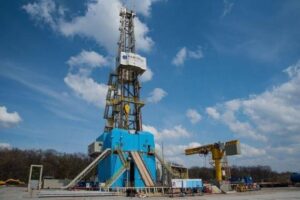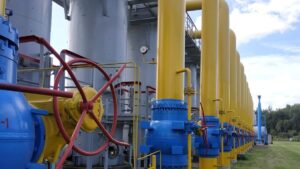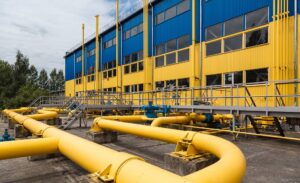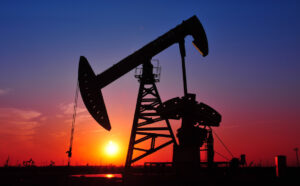
Ukrhazvydobuvannya JSC (UGV) has discovered a new gas field with reserves that may reach 1 billion cubic meters.
“The received geological information indicates that the reserves of the new field may reach 1 billion cubic meters of gas,” Naftogaz Ukrainy said in a press release on Tuesday.
UGV tested a drilling well with a depth of almost 4,000 meters “from scratch” and completed the work in August this year, before drilling the company’s specialists conducted a 3D seismic survey.
“This is not the first discovery of new hydrocarbon deposits this year. By building up reserves, we are creating a prospect for sustainable growth in gas production,” the press release quoted Ukrgasvydobuvannya’s acting general director Oleg Tolmachev as saying.
According to him, UGV will continue the geological exploration program at this field and plans to drill new wells.
As reported, UGV aims to increase natural gas production by 1 billion cubic meters to 13.5 billion cubic meters in 2023. In 2022, UGV produced 12.5 billion cubic meters of natural gas (commercial), which is 3% less than in 2021.
Naftohaz Ukrayiny owns 100 percent of Ukrhazvydobuvannya.

Natural gas reserves in Ukrainian underground gas storages (UGS) have reached 11.7 billion cubic meters of gas, and 1.5 million tons of coal are in the warehouses of power plants, Prime Minister Denis Shmygal said.
“We are also preparing the heat and power sector for winter. Repairs of cogeneration plants, boiler houses, thermal power plants are going on as planned. 11.7 billion cubic meters of gas has already been pumped into Ukrainian gas reservoirs. This is almost 80% of the demand. We have 1.5 million tons of coal in stock, we plan to reach the figure of 1.8 million tons,” Shmygal said at a meeting of the Ukrainian government on Tuesday.
The head of the government called on the Ministry of Recovery, the Ministry of Energy, Ukrenergo and Naftogaz Ukrainy “to maximum concentration of efforts and mobilization of resources.”
As reported, Ukraine has 12 UGS facilities with a total design capacity of 31 billion cubic meters. The country plans to enter the 2023/24 heating season with 14.7bn cu.m. of reserves.

During the preparation for the heating season, Ukraine’s gas storage facilities have already accumulated 11.7 billion cubic meters of gas, and by the beginning of the autumn-winter period, it is planned to reach the figure of 14.7 billion cubic meters, Prime Minister of Ukraine Denys Shmyhal has said.
The Department of Communications of the Secretariat of the Cabinet of Ministers said on July 21 that he said this after a meeting with Deputy Prime Minister for Reconstruction, Minister for Communities, Territories and Infrastructure Development Oleksandr Kubrakov, Head of NJSC Naftogaz Oleksiy Chernyshev, representatives of the Ministry of Infrastructure, the Ministry of Energy, the Ministry of Economy and the Ministry of Finance.
At the meeting, issues of repairs, accumulation of fuel resources, and safety of thermal power facilities were discussed. Reports were heard from the Ministry of Infrastructure and NJSC Naftogaz on the plan for the preparation of thermal power plants for the autumn-winter period 2023/2024 and on the state of implementation of this plan for CHPPs, boiler houses, and thermal power plants.
“As the Ministry of Infrastructure reported, each enterprise has its own equipment repair plan, they are being implemented under the schedules. Those responsible for their observance have been identified. The state of readiness of housing and municipal services facilities has been considered. At the start of the heating season, they should reach 100%. This guarantees a stable winter,” Shmyhal said.
The prime minister also announced an instruction to ensure the protection of thermal power infrastructure facilities from enemy shelling. “Tasks have been set. Responsible persons have been identified. We are working to ensure that it is warm in the homes of Ukrainians,” the head of the Ukrainian government said.

DTEK plans to invest $120-130m in gas production in 2023, the company’s CEO Maxim Timchenko said. “This year we plan to invest $120-130 mln in production. 70% of these funds are for the development of new fields,” he said in an interview with Forbes Ukraine.
According to him, most of the company’s oil and gas assets have already passed peak production, the natural decline at operating wells is 15-18%.
“The only way to compensate for the decline is to develop new fields. This year we are starting to drill on recently purchased licenses… We plan to start drilling in the Mayorovskoye area in the fourth quarter of 2023,” Timchenko said.
The head of DTEK is convinced that Ukraine has huge prospects for gas production at a depth of 6000-7000 meters. “Thanks to the latest technologies, production at such depths is now paying off,” he specified.
Timchenko also said that at the end of 2022, DTEK’s enterprises produced 2 billion cubic meters of gas. At the same time, at the end of the year they had 0.6 billion cubic meters in underground storage facilities due to a drop in consumption and export ban, which led to liquidity problems throughout the first half of this year.
“But now Naftogaz has started buying back gas after all. I was skeptical about Naftogaz’s ability to buy back gas, but NAK has indeed entered the market and is actively buying back gas. Accordingly, we have liquidity, which allows us to fulfill our investment program,” he said.
At the same time, the head of DTEK believes that the authorities “need to discuss the topic of resuming Ukrainian gas exports with the market, because it has a significant impact on the development of Ukrainian gas production”.
As reported, the companies included in DTEK Naftogaz in November 2022 acquired at an open auction the right to develop two gas fields in the Poltava region: Mayorivska area for UAH 1.102 billion and Birkovsko-Zinkovska area for UAH 211 million.
“DTEK Naftogaz” in 2021 increased gas production by 12% (by 0.22 billion cubic meters) compared to 2020 – up to 2.06 billion cubic meters.
“DTEK was established in 2005 to manage the energy assets of Rinat Akhmetov’s System Capital Management (SCM) group.

The Uzbekistan GTL plant has launched wholesale sales of liquefied natural gas, the press service of Uzbekneftegaz reports.
The first batch of 161 tons of fuel was traded at the Republican Commodity Exchange on June 22. Liquefied gas is offered at a starting price of 3.12 million soums per ton and is supplied on the terms of the Shurtan gas chemical complex.
According to the report, LPG is produced from a mixture of propane and butane under pressure. Its small volume simplifies transportation and delivery to consumers, including to the most remote areas.
Shavkat Mirziyoyev launched Uzbekistan GTL in December 2021, after 5 years of construction. The plant processes natural gas into jet fuel, diesel fuel, liquefied gas, oil and other products.
In February 2022, the plant launched its own hydrogen production, and four months later, it started producing synthetic oil and diesel fuel from it. In September, the plant also started producing synthetic jet fuel.
The first batch of GTL diesel went on sale at the beginning of last July. Since then, the manufacturer has reduced the selling price of the fuel five times, by a total of almost 35% compared to the original price.
https://www.spot.uz

China increased oil production by 2.7 percent in May compared with the same month last year, to 18.1 million tons, according to the State Statistics Administration of the country.
Refining output soared 15.4 percent last month to 62 million tons, the second-highest total ever recorded. This was due, among other things, to the completion of scheduled maintenance work at a number of refineries.
Natural gas production in China in May increased by 7.2% and reached 19 billion cubic meters, since the beginning of this year – by 5.3% to 97.3 billion cubic meters.
Oil imports last month totaled 51.44 million tons, up 12.2 percent from the same month a year earlier, customs said. Gas imports rose 17.3% to 10.64 million tons, the highest since January 2022.
CHINA, GAS, OIL, PRODUCTION